By Aloysius Ugwu and Michael Atima (Lead Writers)
It can be said that the death of popular gospel singer, late Mrs. Osinachi Nwachukwu opened up a can of worms. Since her death, allegedly as a result of domestic violence, there have been many stories and videos showing incidences of gender-based violence (GBV) or intimate partner violence (IPV). These stories have been shared widely on various social media platforms.
The question is, when does this stop?
We have written about violence against women in the past and it is difficult to talk about GBV without discussing how dehumanising the experience is, as the assaults, pain and suffering meted out on the victims may leave them close to death if not psychologically traumatised. The World Health Organization described IPV as a “major public health problem” that needs urgent attention.
No longer a shadow pandemic
Violence against women was one of the most widespread violations of human rights before the COVID-19 pandemic. At the height of the pandemic, all types of violence against women and girls, particularly domestic violence, grew to such an alarming rate that the United Nations (UN) labelled it ‘the Shadow Pandemic’. Gender-based violence is still a major public health issue and could be said to be an epidemic on its own, one that is heightened by many factors, including the culture of silence, poor implementation of laws and the lack of support for women and girls who are victims of violence. Like all epidemics, it requires urgent intervention.
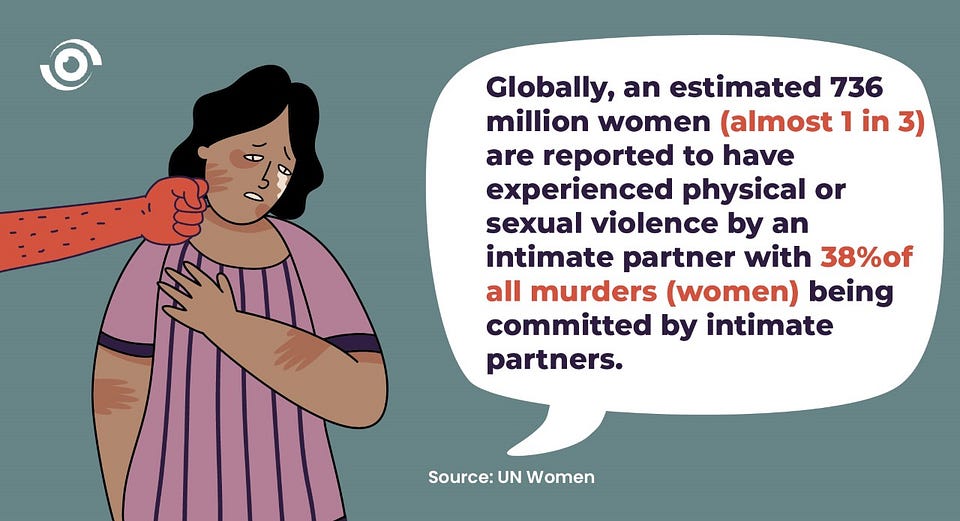
Globally, an estimated 736 million women (almost 1 in 3) are reported to have experienced physical or sexual violence by an intimate partner with 38% of all murders (women) being committed by intimate partners. In Nigeria, the prevalence of various forms of violence against women and girls, including physical intimate partner violence, female genital mutilation, and child marriage is estimated at 14%, 19.2% and 40% respectively. In 2020, the prevalence of physical, sexual or emotional violence by a partner was reported to be at 69%. Gender-based violence causes serious short- and long-term physical, mental, sexual and reproductive health problems for women. It leads to high social and economic costs for women, their families and societies. Their children also suffer a range of behavioural and emotional challenges which sometimes results in them experiencing or perpetrating violence at adulthood.
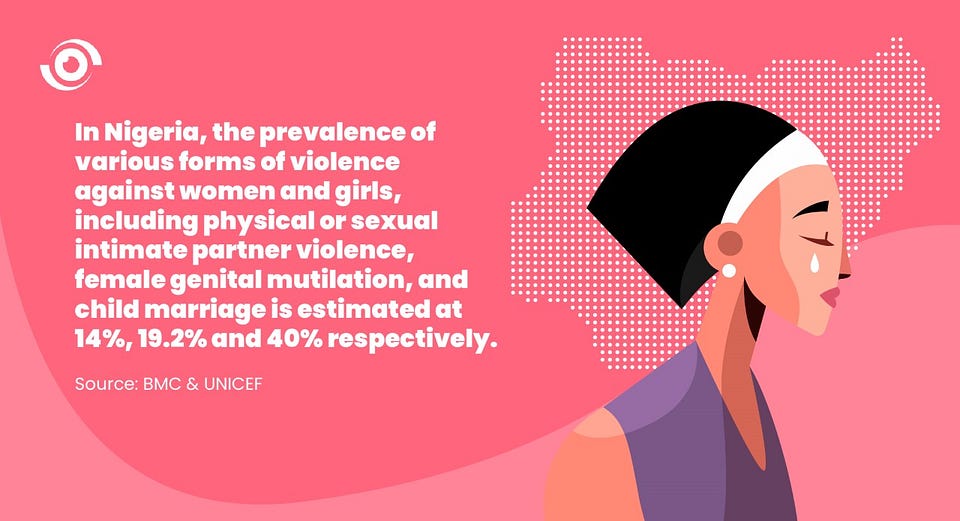
So what of the VAPP Act?
President Goodluck Jonathan signed the Violence Against Persons Prohibition (VAAP) Act into law in 2015. The objective of the Act was to provide a legal framework that will prevent violence against vulnerable people, especially women and girls, as well as protecting against all forms of physical, sexual, psychological, domestic and harmful traditional practices. The Act prohibits discrimination against persons, provides protection and remedies for victims and the punishment of offenders. Specifically, part 2 subsection 1–5 of the Act provides that “a person who batters his or her spouse commits an offence and is liable on conviction to a term of imprisonment not exceeding 3 years or to a fine not exceeding N200,000.00 or both.”
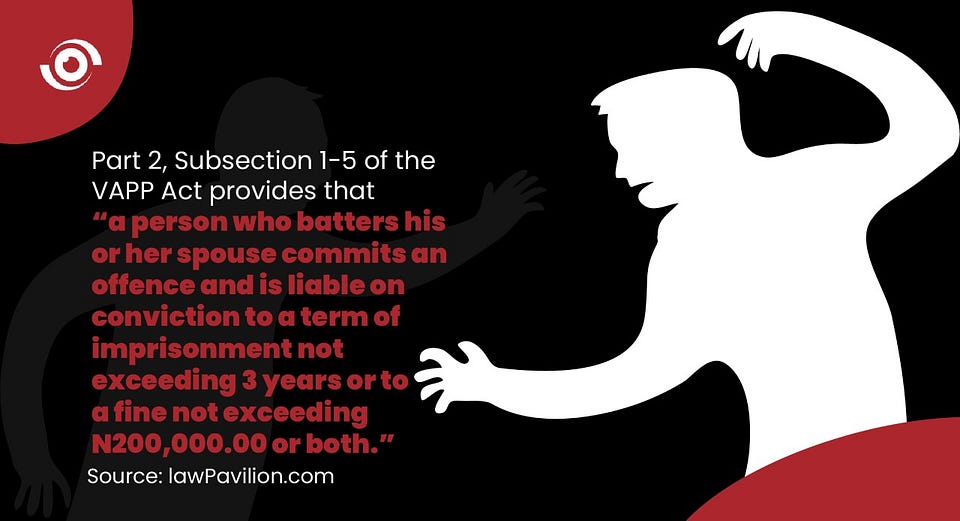
At last count, the Act has been passed and assented to in only 20 states including the Federal Capital Territory (FCT). Information on how many states have implemented the Act and their level of implementation varies across states. The VAPP Act was developed to eliminate and prohibit all forms of violence but until decisive action is taken to effectively implement it at national, state and local level, the culture of gender-based violence will leave women without any legal protection. The Women’s Rights Advancement and Protection Alternative (WRAPA has been working to protect the rights of women in Nigeria, especially in the implementation of legislation that protects women and girls against violence.
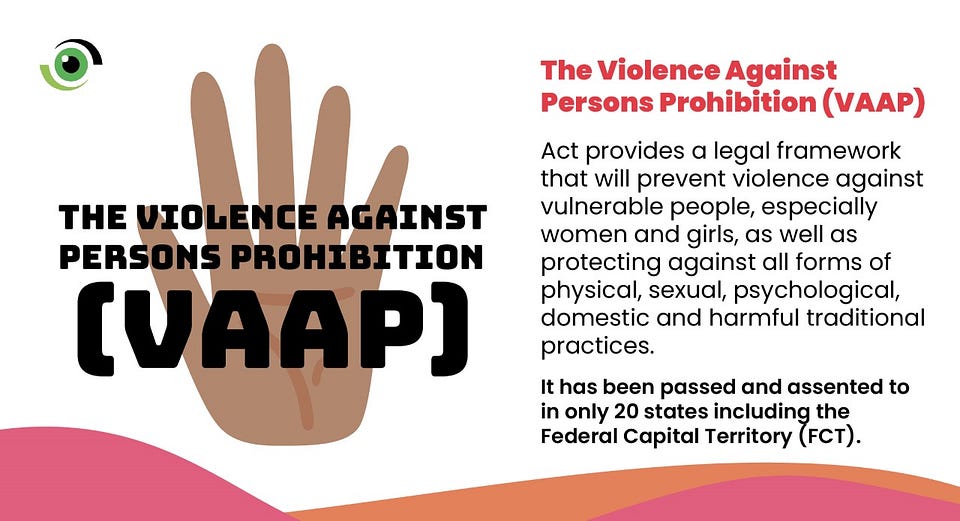
Taking action against GBV
Addressing GBV requires a multi-sectoral approach and everyone — government, civil society organisations, religious leaders, neighbors, friends and family members all have an important part to play. So, as a people, how can we collectively, take action or move against GBV?
(1) Women and girls must know that they are legally protected against all forms of violence. Therefore, government at all levels must ensure that the VAPP Act is passed and implemented in all states of the federation. Following Osinachi Nwachukwu’s death and the pandora’s box it opened, all State Houses of Assembly should ensure that this is done immediately.
(2) The Nigerian Police, the National Agency for the Prohibition of Trafficking in Persons (NAPTIP), and other relevant government agencies must wake up to their responsibilities and work together to investigate issues of intimate partner violence and prosecute perpetrators of this act in accordance with the provisions of the law. They must also ensure that victims are protected.
(3) There must be psychosocial support for victims of GBV. All health care providers must be trained to respond to the needs of survivors holistically and empathetically and empowered to share details of initiatives like the Spotlight Initiative that is providing support for survivors of domestic violence.
(4) Civil society and human rights organisations are critical stakeholders in promoting public enlightenment programs in communities. They must continue to advocate to make violence against women unacceptable and for such violence to be addressed as a public health problem and receive funding support to continue in their work.
(5) Religious leaders are fundamental allies in advocating against GBV. They are duty bound to continue to educate their followers with the right doctrines, encouraging them to speak up against and report every act of violence against women and children to the authorities.
(6) Nobody should be above the law. Every act of violence against women and girls must be prosecuted. The VAPP Act was signed into law seven years ago and it must be fully domesticated across all states and survivors should have recourse to justice from perpetrators.
(7) Victims of domestic abuse must be encouraged to seek help — while issues are being addressed and provided with “safe spaces” to take refuge. Societal stigma or pressure to stay in a violent relationship must stop.
Target 5.2 of the Sustainable Development Goals (SDGs) sets a target that by 2030, countries must “eliminate all forms of violence against women and girls in the public and private spheres, including trafficking and sexual and other types of exploitation.” Nigeria must wake up to the urgent need to declare a state of emergency against all forms of gender-based violence, including domestic violence. Osinachi passed away ten days ago on April 10; we may never know the number of preventable domestic violence deaths or domestic violence incidences that may have occurred within that period. It’s no longer enough to just say, “God forbid” or the other platitudes we tell ourselves. What will you do to prevent gender-based violence from happening on your watch?
If you don’t know where to go or whom to call, please visit this website and find a help centre closest to you.


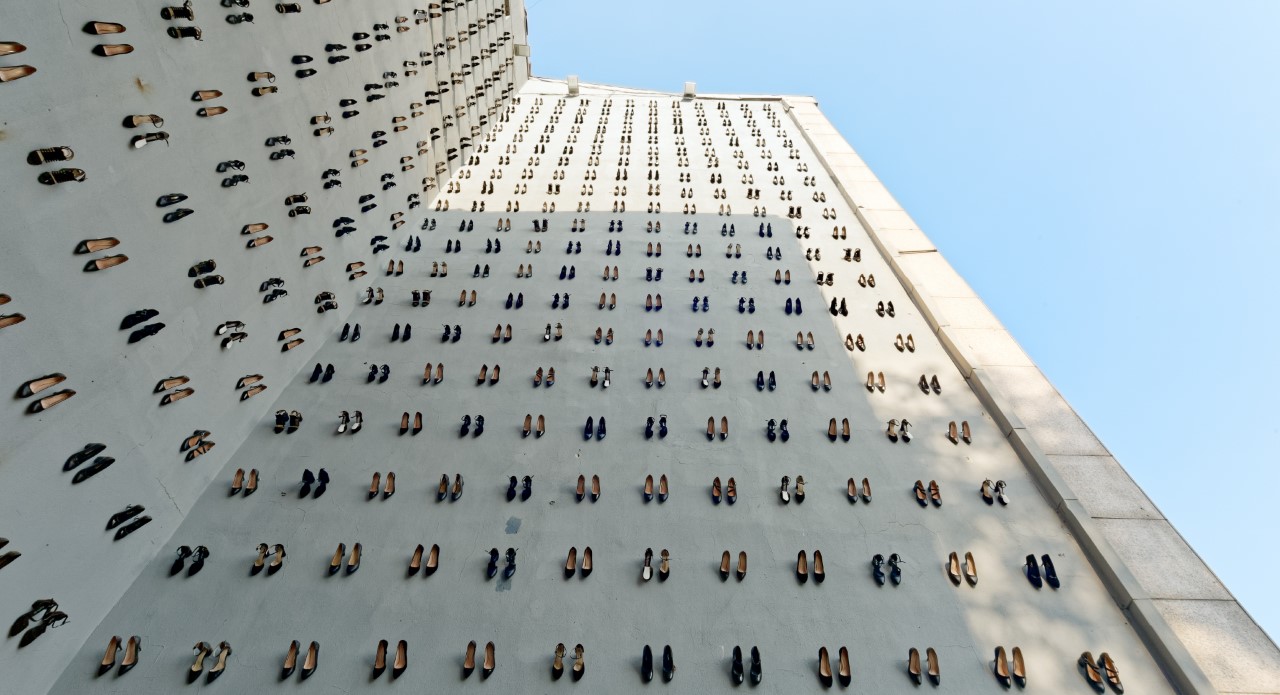
Violence against girls and women, is violence against our mothers and sisters, something that is a taboo in the modern world. Lift no hand against your mother or sister, or say nothing hurting to any of them. As a man, your wife is your temple, irrespective of your religion. Women are men’s keepers after God, and so they deserve men’s respect as equal partners. He who does the contrary is not a man but a bear, and must be taken to where its peers are kept- in the jungles. If the physically-less powerful is not to exist, you would not exist. Be wise!!!
This is a very interesting and informative piece of writeup. It is now up to the suggested stakeholders to leave speculatory roles but rather actively participate to eliminate the said epidemic.
Male involvement and devaluation of patriarchal norms are as well important in this fight
Thumps up @Aloysius and Michael
Plausible as these laws are, enforcing them in the rural communities is likely to face serious cultural and economic challenges. In most villages, the woman see the right of a man to beat his wife as a cultural norm. So, they. grin and bear it. Besides no woman would want to send her husband to jail particularly if he is the sole bread winner.. Therefore, powerful campaign and orientation programs need to be mounted to create awareness and enlighten the on their power and self worth.